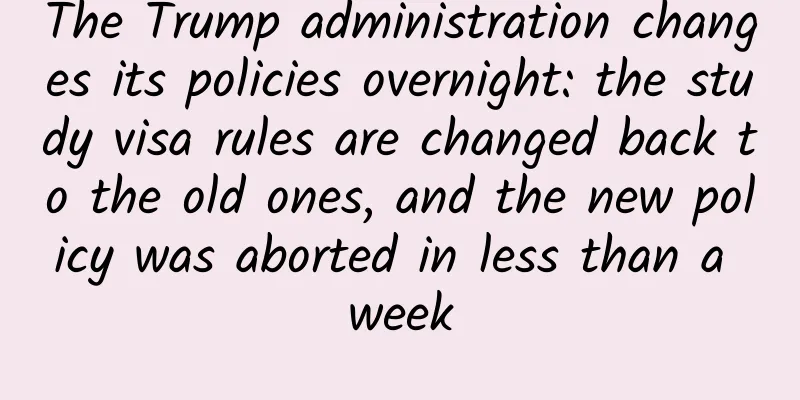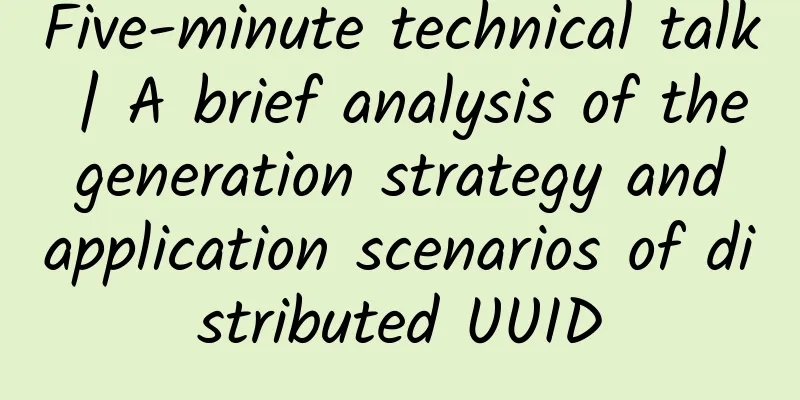The Trump administration changes its policies overnight: the study visa rules are changed back to the old ones, and the new policy was aborted in less than a week

|
This article is reprinted with permission from AI new media Quantum Bit (public account ID: QbitAI). Please contact the source for reprinting. What does it feel like to slap yourself in the face? On July 12, due to public outrage over the newly enacted policy for international students, the U.S. Immigration and Customs Enforcement (ICE) announced that it would officially make changes - basically returning to the "old days." This is definitely great news for international students, as it means they no longer have to modify their fall schedules or worry about their study visas expiring. Today, ICE updated the document showing that the revised rules for studying abroad are as follows:
In addition, students who have paid the I-901 SEVIS fee can rest assured that the document clearly states that such students will not receive a refund or be asked to leave the country. The new regulations also state: Schools that adopt fully online teaching need to send their teaching change plans to SVEP before July 15, while schools that adopt a hybrid of online and offline teaching need to issue new I-20 forms to students and submit teaching change plans before August 1. Earlier this week, ICE released a document requiring that if international students at American universities are unable to attend offline courses in the fall of 2020 and can only take online courses, they will lose their study visas and be deported. This move caused an uproar in public opinion. Scholars including Andrew Ng criticized the move, saying it would harm the United States, students and universities. American universities, such as Stanford, Harvard, and MIT, have taken up legal weapons and announced that they will sue the Trump administration, demanding the withdrawal of this regulation. Just one day before ICE revised its rules, Johns Hopkins University (JHU) also joined the ranks of those opposing and suing the Trump administration. In its official statement, JHU listed several "illegal" actions of the US government:
The facts are sufficient and well-founded. In the face of strong public opinion, the US ICE finally revised the new policy on student visas, thus avoiding an unnecessary lawsuit. Document address: https://www.ice.gov/doclib/sevis/pdf/sevisFall2020_FAQ.pdf |
<<: Do you know the characteristics of 5G core network (5GC)?
>>: 5G economy has arrived, and there is no "hidden corner" for industrial innovation
Recommend
Is your home WiFi secure? Beware of router attacks
WiFi has now been fully integrated into our lives...
Megalayer: US servers start at 199 yuan/month, US 100G high-defense servers start at 299 yuan/month
Megalayer's promotion this month still offers...
Hostmem: $11.99/year KVM-512MB/10GB/500GB/Los Angeles data center
Hostmem is a Chinese VPS service provider. The tr...
Summary and analysis of the top ten optical communication technologies in 2016
5G channel coding technology In October 2016, Hua...
CloudCone 6th Anniversary Promotion Starting from $21.21/year, 1GB/30G SSD/1TB/Los Angeles Data Center
CloudCone started its 6th anniversary promotion i...
A curve shows what stage 5G, autonomous driving, and AI have reached
Recently, Gartner, a world-renowned IT market res...
5G Ready: Enabling Technology to Prepare for the Future of Work
5G opens the door to major technological advances...
5G and Next Generation Networks during the COVID-19 Crisis
The word "crisis" in Chinese means both...
UCloud: CDN traffic package 100GB starts at only 1 yuan, unlimited usage time, 20GB cloud storage + 20GB/month download volume for free
Last month we shared information about UCloud'...
On-Prem vs. Colocation vs. Cloud vs. Edge: Pros and Cons
In today's digital economy, technology has be...
The Bluetooth market will grow steadily in the future, and the Bluetooth SIG will continue to make efforts
On April 15, the Bluetooth Special Interest Group...
Summary of the third phase of 5G technology R&D trials: the newly added 2.6GHz frequency band is consistent with the 3.5GHz test results
On January 23, 2019, the IMT-2020 (5G) Promotion ...
The United States drafted new rules that will allow American companies and Huawei to jointly develop 5G standards
The U.S. Commerce Department is about to sign a n...
Artificial intelligence accelerates industrial innovation and upgrading. How should network infrastructure respond?
In today's digital economy era, digital trans...
If WiFi coverage is not good, should I use a wireless repeater or a powerline modem?
[[240625]] Poor WiFi signal is a headache for man...









